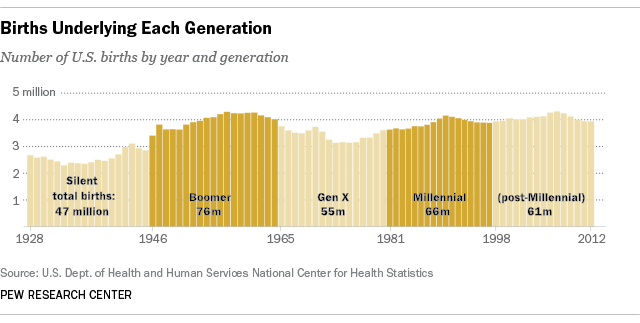Watch Out, Baby Boomers: Millennials Will Be The Largest Generation In 2015

Millennials — young people aged 18 to 34 — are expected to become the biggest generation in 2015, according to a report released by the U.S. Census Bureau. They are poised to surpass baby boomers (ages 51-69), who previously held the top title for largest generation in the U.S.
This year, the number of millennials is expected to be at 75.3 million, while baby boomers are at 74.9 million. Millennials are growing because more immigrants in the age group are entering the country, according to the Pew Research Center.
According to the Pew Research Center chart below, millennials, born between 1981 and 1997, had the largest number of births (66 million) next to boomer births (76 million). Post-millenials, people born between 1998 and 2012, are the third largest (61 million), followed by Generation X and the Silent generation. Because the Silent generation fell in population numbers in the midst of the Great Depression and World War II, people were less likely to have the economic means to have more children. Baby boomers, of course, were born and grew up after the war, when the opposite occurred — with the end of the war, men returned from service, prosperity increased in the country, and families expanded.

“The significance of Millennials extends beyond their numbers,” a White House report about millennials, released in October 2014, said. “This is the first generation to have had access to the Internet during their formative years. Millennials also stand out because they are the most diverse and educated generation to date: 42 percent identify with a race or ethnicity other than non-Hispanic white, around twice the share of the baby boomer generation when they were the same age.”
In addition, there are more educated Millennials than Baby Boomers. The report states some 15 facts about this generation, including that those who went to college are more likely to study social sciences; they’re more likely to focus only on studies rather than combining both work and school; and they’re the first generation to have more health insurance coverage during their young adult years due to the Affordable Care Act (ACA).
Aside from the stereotype that millennials are parental money-consuming, lazy technology addicts, it’s best we give them some credit for their positive attributes because the spotlight is now on them. If you want to see how much of a millennial you are, take this quiz from the Pew Research Center.



























